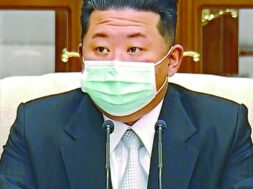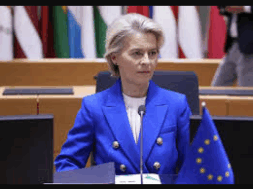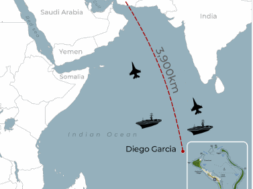
Covid-19: Now, China suspects wind from ‘friendly’ N. Korea spreading infections!
Virendra Pandit
New Delhi: As China relentlessly battles against the continuing coronavirus infections, despite an ongoing brutal ‘Covid-Zero policy’, it suspects that winds blowing in from its ‘friend’ North Korea might be the reason for Beijing’s failure in checking cases at least in the two countries’ border areas.
When North Korea, even before it admitted the fresh outbreak a few weeks ago, suddenly imported millions of face masks, hundreds of ventilators, and vaccines from China, Beijing was apparently unaware of the worsening situation in the neighboring country.
Clearly, a secretive Pyongyang did not share the details even with its mentor, Beijing.
As fresh Covid cases continued to rise nonstop in the Chinese city of Dandong, which shares a border with North Korea, Beijing ordered its local citizens to keep their doors and windows shut and remain locked down to keep away from the wind coming in from North Korea.
Despite a lockdown since the end of April, daily cases have been trending up in Dandong, a city of 2.2 million.
According to the city’s Centers for Disease Control, most of the infected people found in the community during the past week had not been outside of their housing compounds for at least four days prior to their diagnosis, the media reported on Wednesday.
The Chinese officials, therefore, directed the residents living by the Yalu River, which runs between the two countries, to close their windows on days with southerly winds, and get frequently tested.
North Korea and China share a porous, 1,300 km-long border, which in some areas is separated by the Yalu River that is less than a km wide in parts of Dandong, a key trading hub for the two countries.
Before the pandemic, around 70 percent of North Korea’s foreign trade went through Dandong. Officials had suspended rail freight between Dandong and neighboring Sinuiju city in North Korea for much of the pandemic.
A globally isolated North Korea is facing a full-blown pandemic with suspected cases topping over four million since late April, according to the state-run South Korean Central News Agency.
But the Chinese people scarcely trust their government. Many Chinese social media users said the suggestion the coronavirus can travel in the air for hundreds of meters is unscientific. Infections through airborne transmission are unlikely over long distances, particularly in outdoor settings, without repeated exposure.
The mysterious flareup underscores the challenges China faces in adhering to its Covid Zero goal as the virus becomes ever more transmissible and contact tracing breaks down. China’s border towns have been subject to some of the harshest containment measures of the pandemic as the virus persistently seeps in. Ruili, a city on China’s border with Myanmar, has also been in lockdown intermittently for over 160 days, according to local media reports.
In February, China exported USD 311,126 worth of unidentified vaccines to North Korea, unprecedented because Beijing reported no other vaccine exports to North Korea for any other month this year or all of last year.
From January to April, the North Koreans bought over 10.6 million masks from China, having bought none in December 2021. In those four months, China also exported nearly 95,000 thermometers, over 33 times the total amount in 2021.
China exported 1,000 non-invasive ventilators to North Korea in April, worth USD 266,891, as well as laboratory supplies that could be used in Covid-19 test kits. Other medical imports included rubber gloves and protective clothing.
Overall, China’s exports to North Korea hit USD 98.1 million in April, the highest since January 2020, when the figure was USD 186.8 million.
North Korea shut its borders to nearly all trade for most of the pandemic, only recently allowing a trickle of supplies and products from China into the country on trains and ships.
Three aircraft from North Korea’s Air Koryo arrived in China and returned to Pyongyang last week carrying medical supplies, a diplomatic source said.
North Korea’s state media has said that the Covid wave has abated, after daily numbers of people with fever topped 390,000 about two weeks ago, but the World Health Organization (WHO) has cast doubts on Pyongyang’s claims of progress in the fight against the outbreak, saying it believes the situation is getting worse, not better, amid an absence of independent data.
Pyongyang has never directly confirmed how many people have tested positive for the virus, but experts suspect under-reporting in the figures released through government-controlled media, making it difficult to assess the scale of the situation.














